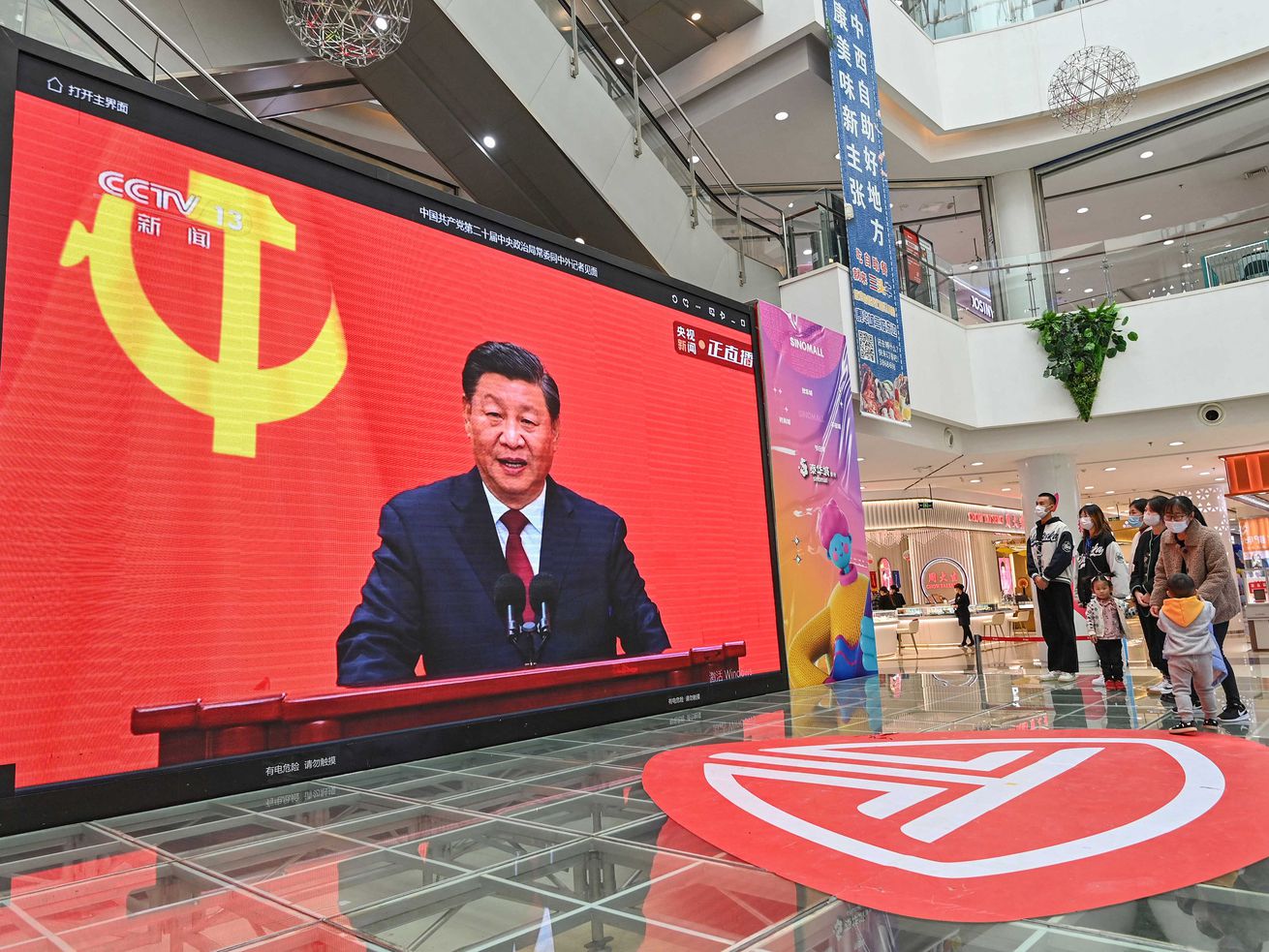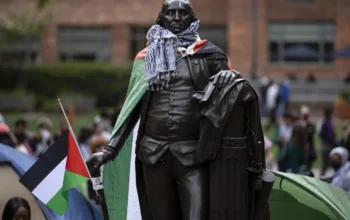China’s 20th Communist Party Congress broke precedent and promoted loyalists.
The removal of a former leader. The deposing of a close ally. The elevation of a cadre of yes-men. China’s 20th Communist Party Congress had it all, and by the end, Chinese President Xi Jinping had secured an even tighter grip on power.
The meeting, which occurs every five years and wrapped up on Saturday, was already a newsworthy event, as Xi was widely expected to cement his hold on China with a third term as leader. Xi, 69, is already older than the unwritten retirement age for Chinese leaders and rewrote the constitution in 2018 to allow him to seek more than two consecutive terms in office; that’s led many observers to believe that he’s setting himself up to be ruler for life.
Xi’s lock on power is an unusual, though not exactly unprecedented phenomenon in the People’s Republic of China; Mao Zedong, the country’s first head of state, only served in that role for ten years, but he remained head of the Communist Party until his death in 1976, with a hand in national policy — including the devastating Cultural Revolution.
But the Party Congress was arguably the clearest, most succinct indicator that the Party, and by extension the People’s Republic of China, belongs to Xi.
The 20th Party Congress was defined not only by Xi’s taking a third term in power, but also by the dramatic proceedings. Xi announced a shakeup in his 24-person Politburo, which for the first time since 1997 contains no women and also deviates from the standard 25-person setup. That group, which is a centralized decision-making committee within the Chinese state, is headed by the general secretary of the Party — Xi Jinping. Now, it’s also stacked with Xi’s people, David Stroup, a lecturer in Chinese politics at the University of Manchester, told Vox via Telegram.
“Broadly speaking, the Standing Committee of the Communist Party,” a seven-member inner circle within the Politburo, “is made up of a group of people who are going to be loyal to Xi, and made up of Xi’s faction,” Stroup said, noting that “other competing factions, like the Communist Youth League faction under former Party Secretary Hu Jintao, had not gotten any representation in this body.”
The Politburo Standing Committee now includes Wang Huning, who has been part of the Standing Committee since 2017 but is moving into a different role; Cai Qi, who will be head of the General Secretariat overseeing everyday party issues; and Li Xi, who will head the Central Commission for Discipline Inspection, the state’s anti-corruption agency. All of these men are older than 65, the typical age limit for membership in the elite body, which indicates “continued pathbreaking and rule-breaking” on Xi’s part to maintain power.
“Xi is surrounding himself with people who are staunch loyalists, and doing so in ways that will reflect that loyalty is a concern that supersedes others,” Stroup said.
Xi continues his pattern of purges
The meeting was also notable for what appear to be high-profile purges, including that of Xi’s current premier, Li Keqiang, and former President Hu Jintao.
Li Qiang, who will be Xi’s deputy in the Party when Li Keqiang stands down in March, is a surprising choice for Xi’s number two, and likely his next premier. He’s never worked in the central government before but did oversee a rather disastrous two-month Covid-19 lockdown in Shanghai, where he is currently the Party secretary. “The disaster of Shanghai Lockdown did not stop Li’s elevation precisely because he followed Xi’s order despite all criticism,” Yang Zhang, a professor of sociology at American University’s School of International Affairs, tweeted, indicating that he’ll be loyal to Xi’s ideology no matter the cost.
While Stroup noted that some rotation on the Standing Committee was expected, the fact that Li Keqiang’s replacement isn’t a technocrat or someone ideologically similar is notable.
“Li [Keqiang] has always been seen as a bit of a counterweight to Xi — not that there is much of a check on Xi at all — but as a moderating influence on Xi,” he said. “As you rotate people like Li off and replace him with hard-liners and people who are more willing to do the things that Xi wants to do, it is a significant shift. Even if we saw this retirement, or moving away from some of the older guys coming, I don’t know that the message that is being sent here is any less surprising or powerful.”
Hu, the former president and Party leader, was much more forcefully removed from the proceedings; he was escorted from the stage of the Great Hall of the People in Beijing by two stewards from his seat beside Xi during Saturday’s closing ceremony.
“There are some people who are saying this is as simple as a botched Covid test,” Stroup told Vox. “I don’t think that rings true. What I would say about Hu’s removal is it was certainly deliberate; at an event this staged, an event this choreographed, an event this scripted, something like that would not have happened if it was not meant to happen […] or if it was not an attempt to derail other things from happening,” like Hu voting against Xi remaining in power, Stroup said.
While the reasons for Hu’s removal aren’t yet clear, the optics are undeniable. Not only is Hu an elder statesman and Xi’s immediate predecessor as head of the Party and of China, but he also resigned those positions after two terms — a precedent Xi dismissed when he amended the constitution in 2018, allowing him to seek more than two consecutive terms in office.
Hu is also the head of a rival faction within the Party, the Communist Youth League, although Xi has stamped out most factions or at least greatly reduced their influence during his tenure. Hu’s faction in particular was focused on trying to rein in the excesses of President Jiang Zemin’s turn toward a free-market economy and pursuing slower, more measured reforms, Stroup told Vox. His dramatic removal may have been an indication to other members of the faction that “their benefactor could not help them, that Hu was not protecting them anymore, that Hu was disempowered.”
Xi is no stranger to purges; he began ridding the Party of potential competitors when he took office in 2012, under the aegis of an anti-corruption campaign. In fairness to Xi, corruption was a significant problem for the Party when he took over. But as Rahul Karan Reddy wrote earlier this year for the Organization for Research on China and Asia, a think tank based in New Delhi, the efforts to root out graft in the Party have allowed him to punish other Party members and political factions that threatened his hegemony. Anti-corruption laws and mechanisms have also extended much further into Chinese society and have been an effective method for Xi to punish dissent.
Xi has consolidated power in other ways — and it’s accelerating
Since Xi assumed leadership of both the nation and the Chinese Communist Party, he’s taken China in a more authoritarian direction. Xi’s government has led ferocious crackdowns on pro-democracy activism in Hong Kong, forced as many as two million ethnic Uyghur, Kazakh, and Uzbek Muslims into brutal labor and “re-education” camps in the Xinjiang Autonomous Region, and threatened those perceived as challenging its power.
He has also introduced his own ideology, Xi Jinping Thought on Socialism with Chinese Characteristics for a New Era, often shortened to Xi Jinping Thought. The 14 principles of Xi Jinping Thought are meant to guide not only military and government doctrine, but are also guidance for everyday people in their relationship with the government. Xi Jinping Thought addresses issues like social welfare and sustainable development, but also unequivocally demonstrates the Party’s — and thus Xi’s — dominance over the nation’s institutions. Ultimately, they are a reminder that, as the first principle states, “Among the party, the government, the military, the people, the academia and all circles, the party leads all.”
Xi Jinping Thought was enshrined into the Chinese constitution as well as the Party constitution during the last Party Congress as a guiding ideology for both. It is also being integrated into curricula from primary school to university levels — perhaps paving the way for it to become as much part of China’s social fabric as Quotations from Chairman Mao Zedong, commonly known in the West as “Mao’s Little Red Book.”
But there have also been accelerated efforts to regulate the personal lives of ordinary Chinese citizens over the past two years, Stroup told Vox. “Things like entertainment, things like ride-sharing apps, tech sectors, even for-profit English teaching, all of these different offshoots are being intensely regulated under the guise of stopping predatory behavior.
Stroup also pointed toward increased sinicization — that is, efforts to integrate people from all of China’s ethnicities, religions, and languages by limiting or prohibiting the expression of those identities in favor of a uniform Chinese identity — as an effort to clamp down on power and quash dissent.
“A lot of these things have different facets and different appearances; some of them look like economic regulations that are attempting to rein in sectors where dissent might bubble up, some of them are more geared toward more culturally determined programming,” he said.
“But all of these things are evidence of sinicization and evidence of centralization — and notable in the past two years especially, in the approach to the Party Congress.
Author: Ellen Ioanes
Read More



